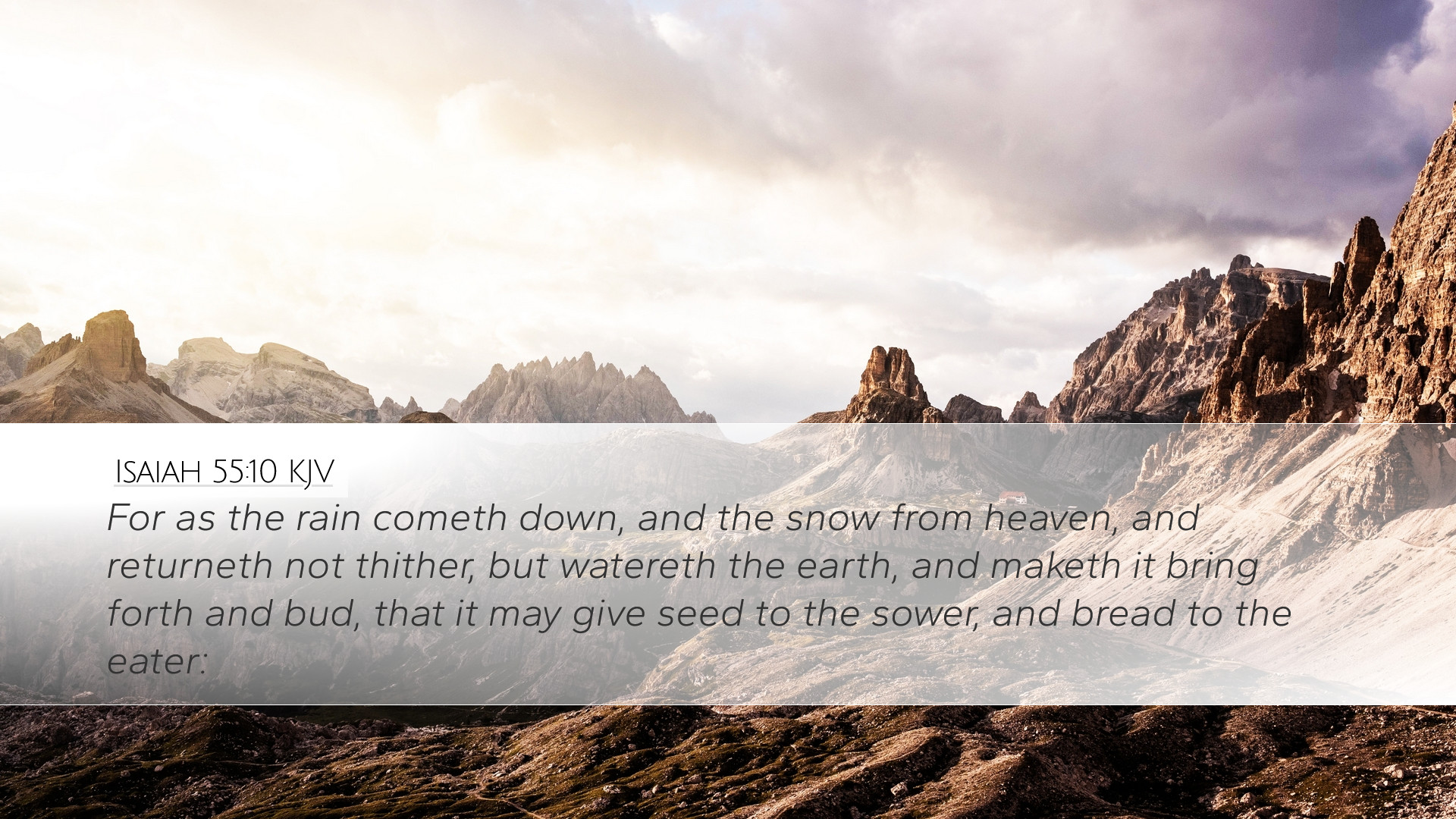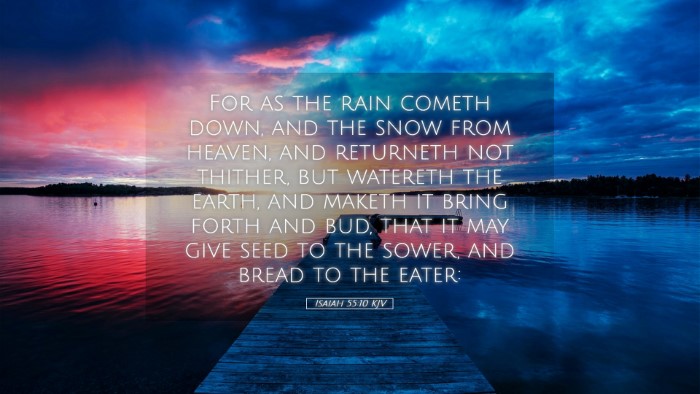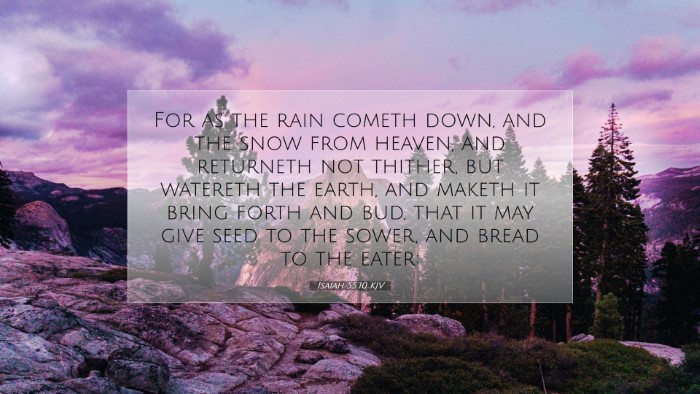Commentary on Isaiah 55:10
Isaiah 55:10 reads: "For as the rain comes down, and the snow from heaven, and returns not thither, but waters the earth, and makes it bring forth and bud, that it may give seed to the sower, and bread to the eater." This verse provides profound insights into the nature and purpose of God’s Word, and its effect on the world.
Overview
This passage serves as a metaphor emphasizing God's Word's role, suggesting that just as rain and snow serve a distinct purpose in nourishing the earth, so does God’s Word serve in fulfilling His divine will. The verse highlights God’s provision and the transformative power of His message.
Exegetical Insights
From an exegetical perspective, various commentaries shed light on the implications of this verse. The symbolic use of rain and snow illustrates a natural order that mirrors spiritual truths.
Matthew Henry's Commentary
Matthew Henry emphasizes the divine origin of the Word. He notes that just as rain and snow come from above, so does God’s Word. It is important to recognize that this is not merely a human invention but rather a divine decree. Henry argues that the effectiveness of God’s Word is inherent and operates similarly to nature. It accomplishes specific purposes, watering the earth and enabling it to produce fruit, paralleling how the Word of God fulfills its intended purpose in the hearts of men.
- Rain and Snow as Divine Instruments: Henry suggests that the analogy indicates a passive reception of God’s grace, emphasizing that the Word will not return void.
- Fruitfulness: Just as the earth brings forth plants when watered, those who receive God’s Word experience spiritual growth that leads to productivity in life.
Albert Barnes' Notes
Albert Barnes provides a theological overview of the verse. He asserts that the intent of the metaphor is to illustrate God’s fidelity in fulfilling His promises through the Word. He expands on the idea that God's Word is sent forth to achieve specific outcomes, and like water, it is indispensable for life.
- The Purpose of God's Word: It serves to give “seed to the sower” and “bread to the eater,” suggesting that the Word nourishes and sustains both spiritual and physical needs.
- Effectiveness: Barnes stresses that God’s Word delivers exactly the nourishment needed for spiritual sustenance and vitality, and it operates without fail.
Adam Clarke's Commentary
Adam Clarke focuses on the nature of divine communication and its assured effects. He posits that the imagery of rain and snow also highlights the necessity of divine revelation in the changing seasons of life. Clarke comments on God’s sovereign role in the reinvigoration and revival that the Word brings into a believer’s life.
- Certain Results: Clarke emphasizes the inevitability of results stemming from God’s Word. Just as rain accomplishes its task of water the land, God’s messages result in transformation.
- Spiritual Implications: The “seed” represents the potential of the gospel and its power to produce faith, while “bread” encompasses the sustenance provided through divine truth.
Theological Reflections
The reflections generated by Isaiah 55:10 invite pastors, students, and theologians to ponder the implications of God’s Word in their ministries and spiritual lives.
- God’s Sovereignty in Ministry: Understanding God’s promise to effectuate His Word encourages believers to remain faithful in proclaiming truth, trusting that God’s will shall be accomplished.
- Encouragement for Evangelism: The assurance that God's Word does not return void should motivate evangelists to share the gospel with confidence, recognizing the potential for spiritual harvests among those who receive it.
- Implications for Spiritual Growth: Believers are reminded of their need for continual nourishment from the Word, which is essential for spiritual vitality and fruitful living.
Practical Applications
In light of this powerful imagery, several practical applications emerge for those engaged in theological education, pastoral care, and personal study.
- Regular Engagement with Scripture: Pastors and students are encouraged to cultivate a daily habit of engaging with God’s Word, understanding its role as spiritual sustenance.
- Preparation for Teaching: As teachers of the Word, there should be an emphasis on presenting God’s truth clearly, knowing that it is God’s responsibility to bring about growth and change.
- Empowerment for Prayer: Recognizing the efficacy of God’s Word can enhance prayer life as believers pray the Scriptures, invoking God’s promises and purposes in their lives.
Conclusion
Isaiah 55:10 stands as a powerful testament to the nature of God’s Word. It encapsulates the themes of divine providence, the assuredness of His promises, and the transformative power of His message. As believers reflect on this, they are reminded of the significance and impact of God’s communication to humanity, warranting a response of faithfulness, engagement, and dependability on His righteous Word.


